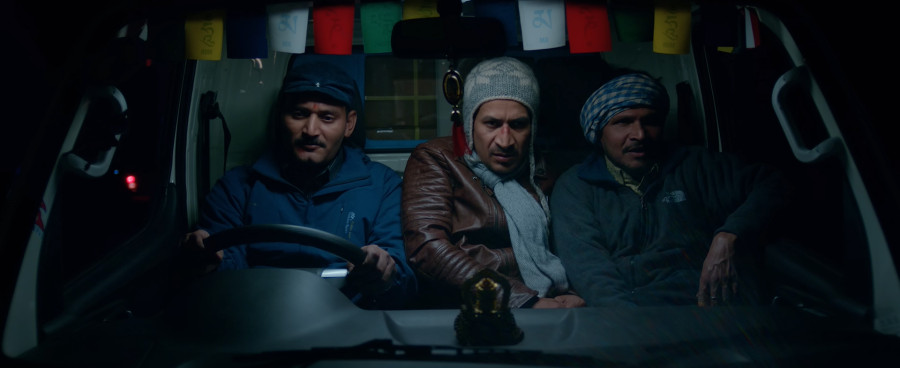Movies
A ‘mahajatra’ indeed
The film offers a humorous yet insightful perspective on the everyday struggles and complexities of human existence.
Risheka Joshi
Four years after his film ‘Jatrai Jatra’ succeeded at the box office, Pradip Bhattarai has returned with another addition to the ‘Jatra’ franchise, ‘Mahajatra’. The smooth storyline and sincere acting makes the film worth watching. The screenplay recognises the contemporary issues of Nepal, ranging from the Kathmandu Metropolitan City’s street vendor rage to the sun and paisa kanda. Though the plotline seems a bit redundant in the second half due to stretched themes, its comedic bits effectively enamour the audience.
After losing Rs30 million in the prequel ‘Jatra’, the film’s heroes, Phadindra Prasad, Jayesh and Munna—played by Bipin Karki, Rabindra Singh Baniya and Rabindra Jha, respectively—have settled down to build a sinless life. The storyline of this film exhibits the events that follow the previous movie. Unlike other ‘so-called’ sequels of Nepali cinema—namely, ‘Nai Nabhannu La’, ‘Ae Mero Hajur’ and ‘Chhakka Panja’—where the newer versions do not follow the prequel’s story, ‘Mahajatra’ picks up right where ‘Jatra’ left off. The cleverly written screenplay also makes this movie a stand-alone and even the viewers who haven’t watched the prequels can follow along.
The three “frenemies” cross paths with each other and their familiar friend—crime—all the time. In the prequels, they were forging banknotes and smuggling gold. Now, they get involved in hiding a big load of cash for a corrupted government official.
These characters embody the struggles of middle-class Nepalis—artists, drivers, and shopkeepers—navigating a capitalist society, often resorting to extreme measures to make ends meet. On the other hand, Hari Bansha Acharya’s portrayal of politician Punya Prasad exposes the puppeteers behind the system, highlighting the stark class divides and power dynamics prevalent in society.
The film aptly portrays how our society nurtures individuals who cannot be trusted with power. Through the character of ‘viral inspector’ Khatri, played by Divya Dev, the writer shows how an individual who wanted to make his country a better place ends up welcoming a brutal fate.
Media plays a significant role in shaping people’s opinions in the movie. ‘The Third Eye’ news channel, with its loud TV reporter, felt really close to reality. It shows how the media earns profit by disseminating sensationalised news rather than remaining intact with ethical reporting. The dramatisation of simple events persuaded the audience (in the movie) to believe a constructed reality—created by the hand-puppeteers.
Additionally, both the viral inspector and Phadindra Prasad's son, portrayed by Arbien Khadka, utilise platforms like Facebook and YouTube to disseminate the truth, underscoring the ongoing struggle between sensationalism and factual reporting in media.
The stereotypical image of women needing to clean after men is demonstrated in the movie. The leading men commit crime, once again, and the ladies—played by Barsha Raut and Rajani Gurung—are alert and save them. Multiple times in the movie Phadindra Prasad says how if his wife, Sampada (Barsha Raut), were there, she would have saved them with her wits. Though Sampada hates her husband’s stupidity, she eventually comes to his rescue.
Punya Prasad is portrayed as a doting father deeply devoted to his son. However, his paternal love drives him to indulge his son with luxuries earned through unethical means, perpetuating corruption and causing harm to others. By the end of the film, the character acknowledges that his corrupt actions were motivated by his desire to provide for his offspring. This reflects the harsh reality of our political landscape.
Besides the solid storyline, the actors’ commitment to their roles deserves praise. Karki, in particular, delivered a stellar performance with his nuanced expressions and delivery. While Rajaram Poudel and Shisheer Bangdel’s roles felt somewhat stereotypical, the actors brought enthusiasm to their portrayals despite the familiar plotline.
The film’s comedic elements occasionally felt forced, with some scenes stretched beyond credibility, especially the frequent encounters with law enforcement experienced by the three friends. Additionally, the lacklustre sound effects during fight scenes raise questions about the technical advancements in Nepali cinema.
Towards the end, a dance number titled ‘Hamro Jodi’, featuring Aashma Biswokarma and Arun Chhetri, was introduced during an election campaign sequence. However, this felt out of place, detracting from the storyline’s coherence and serving as a needless distraction.
A run-in with crime brings Phadindra Prasad to an emotional realisation about how he (and the other characters) lack money not morals and their greed for more money is what makes them act the way they do. This line sums up the central moral of the movie. The friends are seen losing logic when an opportunity to get a lot of money shows up—which is true for many in real life, too.
The film effectively offers viewers a humorous yet insightful perspective on the everyday struggles and complexities of human existence, presenting them in a philosophical light. Overall, ‘Mahajatra’ is an entertaining watch.
Mahajatra

Director: Pradip Bhattarai
Cast: Hari Bansha Acharya, Bipin Karki, Rabindra Singh Baniya, Barsha Raut, Rajani Gurung
Language: Nepali
Duration: 2 hours 20 mins




 16.12°C Kathmandu
16.12°C Kathmandu












